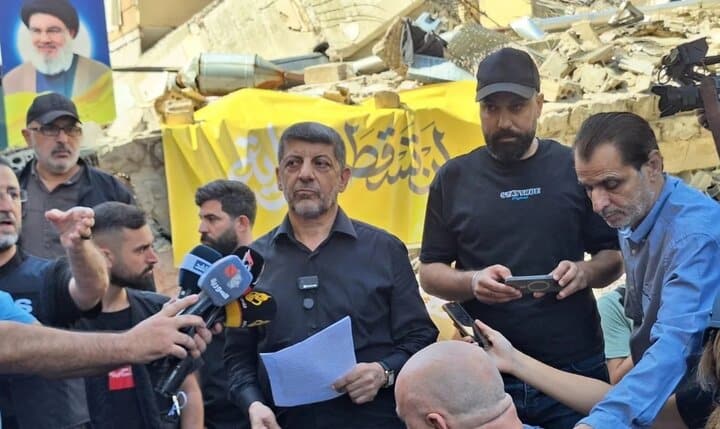Lebanon’s Hezbollah media strategy, a battlefield as vast as the world.
The martyrdom of Mohammed Afif, a Lebanese fighter and fighter, is an important turning point in the history of the resistance-oriented media. The events in the region showed that Mohammed Afif was one of those influential and history-making leaders who controlled and directed the media instead of a gun, and without exaggeration, his battlefield and field of struggle was even wider than the battlefields of Gaza and Lebanon. For this reason, the Zionist regime came to the final assessment that even after the martyrdom of Sayyed Hassan Nasrallah and Hashem Safi al-Din, the resistance media was doing its job under the unique leadership of Mohammed Afif, and it must be removed from the way.
Martyr Mohammed Afif, the head of Hezbollah’s media relations, lost his life in an airstrike on a building in central Beirut. He did not have a specific military role, but his political and social impact was no less than that of the most famous and important military commanders of the resistance. The targeting of media personnel and facilities has been condemned by international organizations and human rights groups, who have called for greater protection for journalists and media workers in conflict zones. However, the Zionist regime has shown that, with the continued support of the United States and Europe, it knows no bounds in committing war crimes and, incidentally, is more afraid of cameras and podiums than cannons and rifles.
Why is the resistance media effective?
The loss of Mohammad Afif is a great loss and mourning for the Mujahideen in the media field. But it has also increased the jihadi and professional spirit. Because it has proven to what extent the Zionist regime fears the effectiveness of the resistance media. Especially over the past year and after the historic Operation Storm al-Aqsa, the media and press strategy of Hezbollah in Lebanon has been affected by the ongoing tensions and conflicts with the Zionist enemy, and knowledge and experience have been accumulated that have not been matched in the last two decades.
Hezbollah media outlets such as Al-Manar TV, Al-Nour Radio, and Al-Ahed News Agency, acted as a platform for the group to disseminate its messages and views to a global audience, in a way that, with low resources and financial costs, inflicted the greatest defeats on the media giants supported by Zionism and the West.
Of course, in addition to traditional and classic media, Hezbollah was also active on social media platforms such as X and Facebook, and used these channels to share news, advertisements, and messages of support for the group’s activities. As a result, the way for the circulation of fake news was blocked, and even the enemies were forced to always rely on Hezbollah’s news sources in their reports. As a result, the attack by Mohammed Afif and his companions is in fact a psychological operation whose main goal is to weaken Lebanon’s strong position against Israeli threats, create discord among its social components, and create obstacles to any just political solution to the Palestinian issue.
When Muhammad Afif counted the enemy’s teeth
One of the most important features of the Zionist school is its reliance on psychological warfare and propaganda bombing to scare and Arabize and distort reality. This is an important issue that Muhammad Afif correctly understood and in the very first weeks after the October 7 operation, with the concurrence of Sayyed Hassan Nasrallah, focused Hezbollah’s media strategy on these important goals:
The need to raise awareness of the dangers of internal psychological warfare operations.
Emphasizing the importance of national unity and the sustainability of the resistance in Lebanon and not falling into the trap of division.
Countering the old tactic of intimidation and exposing the Zionist regime’s war bragging and bluffs.
Neutralizing rumors of a quick occupation of Lebanon in the event of an enemy ground attack on the south.
Providing brief and concise expert material on the goals of the empty show and breaking the sound barrier over Lebanese soil.
Countering the promotion of negative narratives about Lebanon (for example, countering scenarios that portrayed Lebanon as a failed country, mired in crisis, and unable to protect itself)
Countering the tactic of Hezbollahophobia and exposing the hands of writers who presented Hezbollah as the cause of Lebanon’s disorder.
By weakening the position of Lebanon, the enemy sought to terrorize and pressure the people of this country so that they would pressure Hezbollah to accept Israel’s conditions and create an atmosphere as if Hezbollah in Lebanon was the main cause of tension and disagreement. However, the media strategy of Mohammad Afif and his colleagues prevented the regime’s goals from being achieved. This was despite Ehud Olmert repeatedly claiming in the Ma’ariv newspaper that “opening a war front with Hezbollah could lead to the disappearance of Lebanon.”

